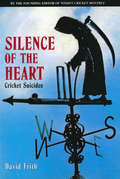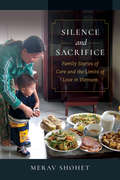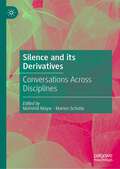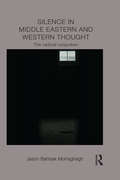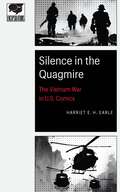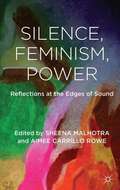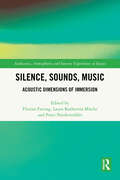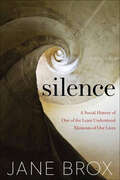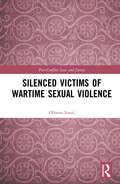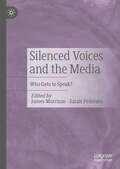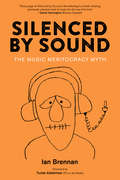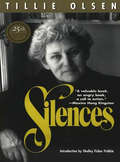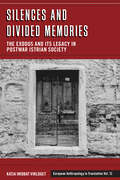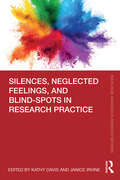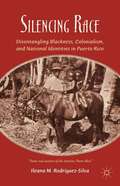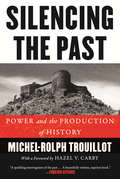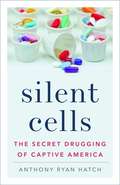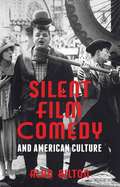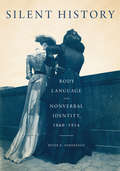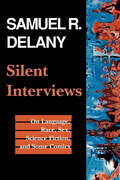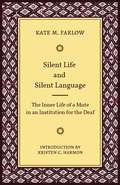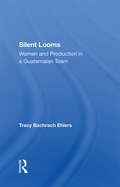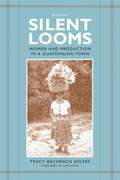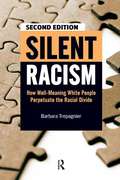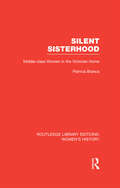- Table View
- List View
Silence Of The Heart: Cricket Suicides
by David FrithCricket has an alarming suicide rate. Among international players for England and several other countries it is far above the national average for all sports: and there have been numerous instances at other levels of the game. For thirty years, celebrated cricket author David Frith has collected data on this sad subject. Silence of the Heart is his compelling account of over a hundred cricketers - involving top names from the past hundred years - who have taken their own lives, with an explanation of factors that led to their premature deaths. Can the shocking rate of self-destruction among cricketers be reduced? Can those who run the game do something to save its participants from this dreadful fate? These are among the questions addressed within this catalogue of biographies. But the key question is whether cricket itself is to blame for its losses - or is that this summer game attracts people of a melancholic and over-sensitive nature? Stoddart, Shrewsbury, Gimblett, Bairstow, Trott, Iverson, Robertson-Glasgow, Barnes . . . There remains a sense of disbelief that these high-profile cricketers killed themselves. And many more cases are examined in this extraordinary book, which comes crammed with detail, is not devoid of humour, and must rank among the most intricately researched volumes in cricket's extensive library.With a foreword by former England captain Mike Brearley, now a psychotherapist, Silence of the Heart is a startling investigative narrative covering the phenomenon of cricket's unduly high level of suicide.
Silence and Sacrifice: Family Stories of Care and the Limits of Love in Vietnam
by Merav ShohetHow do families remain close when turbulent forces threaten to tear them apart? In this groundbreaking book based on more than a decade of research set in Vietnam, Merav Shohet explores what happens across generations to families that survive imperialism, war, and massive political and economic upheaval. Placing personal sacrifice at the center of her story, Shohet recounts vivid experiences of conflict, love, and loss. In doing so, her work challenges the idea that sacrifice is merely a blood-filled religious ritual or patriotic act. Today, domestic sacrifices—made largely by women—precariously knot family members together by silencing suffering and naturalizing cross-cutting gender, age, class, and political hierarchies. In rethinking ordinary ethics, this intimate ethnography reveals how quotidian acts of sacrifice help family members forge a sense of continuity in the face of trauma and decades of dramatic change.
Silence and its Derivatives: Conversations Across Disciplines
by Mahshid Mayar Marion SchulteThis edited book examines silence and silencing in and out of discourse, as viewed through a variety of contexts such as historical archives, day-to-day conversations, modern poetry, creative writing clubs, and visual novels, among others. The contributions engage with the historical shifts in how silence and silencing have been viewed, conceptualized and recorded throughout the course of the twentieth and twenty-first centuries, then present a series of case studies from disciplines including linguistics, history, literature and culture, and geographical settings ranging from Argentina to the Philippines, Nigeria, Ireland, Morocco, Japan, South Africa, and Vietnam. Through these examples, the authors underline the thematic and methodological contact zones between different fields and traditions, providing a stimulating and truly interdisciplinary volume that will be of interest to scholars across the humanities.
Silence in Middle Eastern and Western Thought: The Radical Unspoken (Intersections: Colonial and Postcolonial Histories)
by Jason Bahbak MohagheghPresenting an engaging reflection on the work of prominent modern Iranian literary artists in exchange with contemporary Continental literary criticism and philosophy, this book tracks the idea of silence – through the prism of poetics, dreaming, movement, and the body – across the textual imaginations of both Western and Middle Eastern authors. Through this comparative nexus, it explores the overriding relevance of silence in modern thought, relating the single concept of "the radical unspoken" to the multiple registers of critical theory and postcolonial writing. In this book, the theoretical works of Georges Bataille, Maurice Blanchot, Gaston Bachelard, Antonin Artaud, and Gilles Deleuze are placed into a charged global dialogue with the literary-poetic writings of Sadeq Hedayat, Ahmad Shamlu, Nima Yushij, Esmail Kho’i, and Forugh Farrokhzad. It also examines a vast spectrum of thematic dimensions including disaster, exhaustion, eternity, wandering, insurrection, counter-history, abandonment, forgetting, masking, innocence, exile, vulnerability, desire, excess, secrecy, formlessness, ecstasy, delirium, and apocalypse. Providing comparative criticism that traces some of the most compelling intersections and divergences between Western and Middle Eastern thought, this book is of interest to academics of modern Persian literature, postcolonial studies, Continental philosophy, and Middle Eastern studies.
Silence in the Quagmire: The Vietnam War in U.S. Comics (Encapsulations: Critical Comics Studies)
by Harriet E. EarleIn Silence in the Quagmire Harriet E. H. Earle uses silence to construct a narrative of the Vietnam War via U.S. comics. Unlike the vast majority of cultural artifacts and scholarly works about the war, which typically focus on white, working-class American servicemen and their experiences of combat, Earle&’s work centers less-visible players: the Vietnamese on both sides of the conflict, women and girls, and returning veterans. Earle interrogates the ways this conflict is represented in American comic books, with special focus on these missing groups. She discusses how—and more critically why—these groups are represented as they are, if they&’re represented at all, and the ways these representations have affected views of the war, during and since. Using Michel Foucault&’s understanding of silence as discourse, Earle considers how both silence and silencing are mobilized in the creation of the U.S.-centric war narrative. Innovative in its structure and theoretical scaffolding, Silence in the Quagmire deepens our understanding of how comic books have represented the violence and trauma of conflict.
Silence, Feminism, Power
by Aimee Carrillo Rowe Sheena MalhotraAn interrogation of the often-unexamined assumption that silence is oppressive, to consider the multiple possibilities silence enables. The volume features diverse feminist reflections on the nuanced relationship between silence and voice to foreground the creative, meditative, generative and resistive power our silences engender.
Silence, Sounds, Music: Acoustic Dimensions of Immersion (Ambiances, Atmospheres and Sensory Experiences of Spaces)
by Florian Freitag Laura Katharina Mücke Peter NiedermüllerThis book examines the intersections of silence with immersive arts and experiences. Silence and immersion may seem antithetical: while immersion is supposedly induced by acoustic and other stimuli, silence is commonly understood as the absence or opposite of sound. Since the eighteenth century, however, silence has been established as a multifarious and polyvalent cultural concept. Immersion, in turn, though often used as a simple "all-inclusive" term, has old and complex ontological and epistemological roots.Organized into three parts, this book brings critical, historical, and theoretical debates on silence into dialogue with different notions of immersion. The 16 theoretical articles and case studies engage in discovering and questioning the continued prominence of both concepts in aesthetics, culture, and media. Covering music, film, digital, visual and performance art, theater, video games, and theme parks, the chapters discuss both highly canonical and rarely examined artifacts. Written by scholars from Germany, Austria, France, and Switzerland, the interdisciplinary collection includes perspectives from musicology, film studies, cultural and media studies, gender studies, art history, and philosophy.Silence, Sounds, Music addresses both an academic and a wider audience. It will be of interest to anyone interested in music, sound, immersive experiences, the so-called experience economy, and contemporary art and culture.
Silence: A Social History of One of the Least Understood Elements of Our Lives
by Jane BroxA compelling history of silence as a shaper of the human mind—in prisons, in places of contemplation, and in our own lives—from the author of Brilliant.Through her evocative intertwined histories of the penitentiary and the monastery, Jane Brox illuminates the many ways silence is far more complex than any absolute; how it has influenced ideas of the self, soul, and society. Brox traces its place as a transformative power in the monastic world from Medieval Europe to the very public life of twentieth century monk Thomas Merton, whose love for silence deepened even as he faced his obligation to speak out against war. This fascinating history of ideas also explores the influence the monastic cell had on one of society’s darkest experiments in silence: Eastern State Penitentiary. Conceived of by one of the Founding Fathers and built on the outskirts of Philadelphia, the penitentiary’s early promulgators imagined redemption in imposed isolation, but they badly misapprehended silence’s dangers.Finally, Brox’s rich exploration of silence’s complex and competing meanings leads us to imagine how we might navigate our own relationship with silence today, for the transformation it has always promised, in our own lives. “Brox writes beautifully . . . Silence for her is a force of nature, awe provoking, like lightning, capable of electrocuting us and of illuminating the night.” —The New York Times Book Review“Silence is an uncommon book on an increasingly uncommon phenomenon, a gift to be treasured in the din of daily life.” —Megan Marshall, Pulitzer Prize–winning author“A perceptive and subtle meditation about a ‘true reckoning with the self.’” —Kirkus Reviews
Silenced Victims of Wartime Sexual Violence (Post-Conflict Law and Justice)
by Olivera SimicThe condemnation of wartime sexual violence as a gross violation of human rights has received widespread support. While rape and other forms of sexual violence have attracted considerable local and international attention, this often excludes wartime sexual violence among women belonging to so-called ‘perpetrator’ war-torn nations. This book explores the silence surrounding women’s experiences of wartime sexual violence within academic, legal and public discourses. Olivera Simić argues that the international criminal law and feminist legal discourse on wartime sexual violence can construct a problematic victim hierarchy that excludes and misrecognises certain women’s experiences of sexual violence during and after armed conflict. The book focuses on the experiences of Bosnian Serb women, where the collapse of the former Yugoslavia led to brutal war and gross human rights violations throughout the 1990s. Two decades after the war, women in Bosnia and Herzegovina are still facing the legacies of the violence in the 1990s. Through this case Simić argues that while all women survivors of rape face problems of stigma, shame and lack of political visibility, their legal and symbolic status differ according to their ethno-national identity. Drawing on interviews with Bosnian Serb women survivors of rape in Bosnia and Herzegovina, feminist activists, local media, documentary and archival sources, the book examines ‘post-conflict justice’ as it is seen, lived and interpreted by women who belong to ‘perpetrator’ nations and will be of great interest and use to researchers, students and practitioners within post-conflict law and justice, international criminal law, security studies and gender studies.
Silenced Voices and the Media: Who Gets to Speak?
by James Morrison Sarah PedersenThis edited collection delves into the multifaceted theme of 'Silenced Voices,' showcasing a diverse array of perspectives from scholars around the globe. From historical reflections to contemporary analyses, the book examines the complex dynamics of voice suppression and enablement across different media landscapes. Divided into four thematic sections, the chapters explore the challenges faced by marginalized and mainstream voices alike. From the portrayal of silenced narratives in the news media to the representation of underrepresented groups in cultural production, the collection spans a wide spectrum of issues. Authors employ varied methodological approaches to investigate the silencing of voices in the realms of politics, society, and professional media practices. Offering fresh insights and critical reflections, this volume serves as a timely contribution to ongoing debates surrounding freedom of expression, fake news, and the complexities of contemporary media environments.
Silenced by Sound: The Music Meritocracy Myth
by Ian BrennanPopular culture has woven itself into the social fabric of our lives, penetrating people's homes and haunting their psyches through images and earworms. Justice, at most levels, is something the average citizen may have little influence upon, leaving us feeling helpless and complacent. But pop music is a neglected arena where concrete change can occur—by exercising active and thoughtful choices to reject the low-hanging, omnipresent corporate fruit, we begin to rebalance the world, one engaged listener at a time.Silenced by Sound is a powerful exploration of the challenges facing art, music, and media. Ian Brennan delves into his personal story to address the inequity of distribution in the arts and demonstrates that there are millions of talented people around the world more gifted than the superstars for whom billions of dollars are spent to promote the delusion that they have been blessed with unique genius.Silenced by Sound is defined by muscular, terse, and poetic verse, and a nonlinear format rife with how-to tips and anecdotes. The narrative is driven and made corporeal via the author's ongoing field-recording chronicles, his memoir-like reveries, and the striking photographs that accompany these projects. After reading it, you'll never hear quite the same again.
Silences
by Tillie OlsenA landmark survey of disenfranchised literary voices and the forces that seek to silence them—from the influential activist and author of Tell Me a Riddle. With this groundbreaking work, Olsen revolutionized the study of literature by shedding critical light on the writings of marginalized women and working-class people. From the excavated testimony of authors&’ letters and diaries, Olsen shows us the many ways the creative spirit, especially in those disadvantaged by gender, class, or race, has been suppressed through the years. Olsen recounts the torments of Herman Melville, the shame that brought Willa Cather to a dead halt, and the struggles of Olsen&’s personal heroine Virginia Woolf, the greatest exemplar of a writer who confronted the forces that worked to silence her. First published in 1978, Silences expanded the literary canon and the ways readers engage with literature. This 25th-anniversary edition includes Olsen&’s classic reading lists of forgotten authors and a new introduction. Bracing and prescient, Silences remains &“of primary importance to those who want to understand how art is generated or subverted and to those trying to create it themselves&” (Margaret Atwood, The New York Times Book Review). &“A valuable book, an angry book, a call to action.&” —Maxine Hong Kingston &“Silences helped me to keep my sanity many a day.&” —Gloria Naylor, author of Mama Day &“[Silences is] &‘the Bible.&’ I constantly return to it.&” —Sandra Cisneros, author of The House on Mango Street &“Silences will, like A Room of One&’s Own, be quoted where there is talk of the circumstances in which literature is possible.&” —Adrienne Rich, author of Diving into the Wreck
Silences and Divided Memories: The Exodus and its Legacy in Post-War Istrian Society (European Anthropology in Translation #12)
by Katja Hrobert VirlogetThe Istrian Peninsula, which is made up of modern-day Croatia, Slovenia, and Italy suffered from the so-called "Istrian exodus" after the Second World War. This book looks at this difficult, silenced past and shifts the usual focus from migrants to those who stayed behind and to the new immigrants who came to the “emptied” towns.The research, based on individual memories, deals with silences and competing national discourses, reasons to stay and leave, hybrid border ethnic identities, and the renewal of Istrian society and its new social relations. It is a self-critical reflection on an ignored chapter of national history, which, with an empathetic approach, allows the silence to speak.
Silences, Neglected Feelings, and Blind-Spots in Research Practice (Routledge Advances in Research Methods)
by Kathy DavisThis book addresses wide-ranging dilemmas that social researchers may face as a result of silences, neglected feelings, and blind-spots in their research. In every research endeavour, thoughts, intuitions, biases, feelings or sensations may be left aside as the researcher attempts to come to terms with the complexities of material and figure out what the ‘main issue’ is. Researchers may pay attention to their own emotional responses during the interview, but often only in their field notes. Rarely do feelings of shock, irritation, boredom or, for that matter, amusement, excitement and delight find their way into the analysis itself. In addition, researchers are all susceptible to blind-spots, often unaware of what is being avoided in research or omitted from it. However, reflection about precisely these gaps or silences may prove essential for developing new and interesting questions as well as comprehensive, responsive, and responsible research practices. In this volume, an international, cross-disciplinary cohort of researchers think critically about the silences, neglected feelings, and blind-spots in their own work, and offer insights for enhancing research practices. As such, it will appeal to scholars across the social sciences with interests in research methods and methodology.
Silencing Race: Disentangling Blackness, Colonialism, and National Identities in Puerto Rico
by Ileana M. Rodriguez-SilvaSilencing Race provides a historical analysis of the construction of silences surrounding issues of racial inequality, violence, and discrimination in Puerto Rico. Examining the ongoing racialization of Puerto Rican workers, it explores the 'class-making' of race.
Silencing the Past: Power and the Production of History
by Michel-Rolph TrouillotForeword by Hazel V. Carby A modern classic about power and the making of history, with a new foreword by a prominent scholar Michel-Rolph Trouillot places the West's failure to acknowledge the most successful slave revolt in history, the Haitian Revolution, alongside denials of the Holocaust and the debate over the Alamo and Christopher Columbus in this moving and thought-provoking meditation on how power operates in the making and recording of history. <P><P> Silencing the Past analyzes the silences in our historical narratives, what is left out and what is recorded, what is remembered and what is forgotten, and what these silences reveal about inequalities of power. Weaving personal recollections from his lifetime as a student and teacher of history, Trouillot exposes forces less visible--but no less powerful--than gunfire, property, and political crusades. This twentieth-anniversary edition of Trouillot's pioneering work features a new foreword from renowned scholar Hazel V. Carby that speaks to the continuing influence of Silencing the Past on the fields of anthropology, history, and African American, Caribbean, and postcolonial studies--as well as to the book's unique pedagogical value as an introduction to historical analysis.
Silent Cells: The Secret Drugging of Captive America
by Anthony Ryan HatchA critical investigation into the use of psychotropic drugs to pacify and control inmates and other captives in the vast U.S. prison, military, and welfare systemsFor at least four decades, U.S. prisons and jails have aggressively turned to psychotropic drugs—antidepressants, antipsychotics, sedatives, and tranquilizers—to silence inmates, whether or not they have been diagnosed with mental illnesses. In Silent Cells, Anthony Ryan Hatch demonstrates that the pervasive use of psychotropic drugs has not only defined and enabled mass incarceration but has also become central to other forms of captivity, including foster homes, military and immigrant detention centers, and nursing homes. Silent Cells shows how, in shockingly large numbers, federal, state, and local governments and government-authorized private agencies pacify people with drugs, uncovering patterns of institutional violence that threaten basic human and civil rights. Drawing on publicly available records, Hatch unearths the coercive ways that psychotropics serve to manufacture compliance and docility, practices hidden behind layers of state secrecy, medical complicity, and corporate profiteering.Psychotropics, Hatch shows, are integral to &“technocorrectional&” policies devised to minimize public costs and increase the private profitability of mass captivity while guaranteeing public safety and national security. This broad indictment of psychotropics is therefore animated by a radical counterfactual question: would incarceration on the scale practiced in the United States even be possible without psychotropics?
Silent Film Comedy and American Culture
by Alan BiltonBilton's study of early 20th century American culture interprets the anarchic absurdity of slapstick movies as a form of collective anxiety dream, their fantastical images and illogical gags bypassing rational thought to express the unconscious fears, wishes and concerns of the modern age. Silent film comedy, with its childlike love of the illogical, the destructive and the anti-social, seems to suggest a form of comic revolt against the mechanisation and the uniformity of the machine age, but the book also charts how a new consumer culture sought simultaneously to tame and contain these energies, redirecting them in the service of a newly emergent mass culture. Not just a film history of the silent era, Bilton also provides a provocative and lively engagement with the origins of mass culture, tracing the origins of Hollywood's dream factory and alongside it the roots of our own irrational, childlike, celebrity-obsessed consumer culture.
Silent History: Body Language and Nonverbal Identity, 1860-1914
by Peter K. AnderssonThe written and verbal traces of the past have been extensively studied by historians, but what about the nonverbal traces? In recent years, historians have expanded their attention to other kinds of sources, but seldom have they taken into account the most vital and omnipresent nonverbal aspect of life – body language. Silent History explores the potential of early photography to uncover the structure and nature of everyday body language in the late nineteenth and early twentieth centuries. Through a close study of street photography by pioneering photographers who were the first to document urban everyday life with hidden cameras, Peter Andersson examines a key period of history in a new light. By focusing on a number of body poses and gestures common to the nonverbal communication of the fin de siècle, he reveals the identifications and connotations of daily social interaction beyond the written word. Andersson also depicts a broader picture of the body and its relationship to popular culture by placing photographic analysis within a context of magazine illustration, caricature, music-hall entertainment, and the elusive urban subcultures of the day. Studying archival photographs from Austria, England, and Sweden, Silent History provides a clear picture of the emergence of the modern bodily conventions that still define us.
Silent Interviews: On Language, Race, Sex, Science Fiction, and Some Comics-A Collection of Written Interviews
by Samuel R. DelanySamuel R. Delany, whose theoretically sophisticated science fiction and fantasy has won him a broad audience among academics and fans of postmodernist fiction, offers insights into and explorations of his own experience as writer, critic, theorist, and gay black man in his new collection of written interviews, a form he describes as a type of "guided essay." Gathered from sources as diverse as Diacritics and Comics Journal, these interviews reveal the broad range of his thought and interests.
Silent Life and Silent Language: The Inner Life of a Mute in an Institution for the Deaf (Gallaudet Classics Deaf Studie #11)
by Kristen C. Harmon Kate M. FarlowSilent Life and Silent Language presents a fictionalized account of life at a Midwestern residential school for deaf students in the years following the Civil War. Based on the experiences of the author, who became deaf at the age of nine and entered a residential school when she was twelve, this historical work is remarkable and rare because it focuses on signing deaf women’s lives. One of only a few accounts written by deaf women in the 19th century, Silent Life and Silent Language gives a detailed description of daily life and learning at the Indiana Asylum for the Education of the Deaf and Dumb. Kate M. Farlow wrote this book with the goal of giving hearing parents hope that their deaf children would be able to lead happy and productive lives. She sought to raise awareness of the benefits of deaf schools and was an early advocate for the use of American Sign Language and of bilingual education. The Christian influence on the school and on the author is strongly present in her writing and reflects an important component of deaf education at the time. Descriptions of specific signs, games, ASL story nights, and other aspects of the signing community during the 1870s will be of interest to modern students and researchers in linguistics, deaf education, Deaf studies, and Deaf history. Farlow’s work reveals a sophisticated, early understanding of the importance of access to language, education, and community for deaf individuals.
Silent Looms: Women And Production In A Guatemalan Town
by Tracy Bachrach Ehlers"In her book, Silent Looms: Women and Production in a Guatemalan Town, Tracy Bachrach Ehlers captures the paradox of gender relations in a society that accords power and authority to men yet leaves the major burden of child care and economic maintenance of the family to women. Most monographs on Maya populations have either ignored women's contributions to the indigenous economy or, when they have included women's work, have ignored the contradiction between patriarchal ideology and observed behavior that is increasingly sharpened by the political and economic transformations taking place. "
Silent Looms: Women and Production in a Guatemalan Town
by Tracy Bachrach EhlersBased on new fieldwork in 1997, Tracy Bachrach Ehlers has updated her classic study of the effects of economic development on the women weavers of San Pedro Sacatepéquez. Revisiting many of the women she interviewed in the 1970s and 1980s and revising her earlier hopeful assessment of women's entrepreneurial opportunities, Ehlers convincingly demonstrates that development and commercial growth in the region have benefited men at the expense of women.
Silent Racism: How Well-Meaning White People Perpetuate the Racial Divide (Second Edition)
by Barbara TrepagnierVivid and engaging, Silent Racism persuasively demonstrates that silent racism―racism by people who classify themselves as “not racist”―is instrumental in the production of institutional racism. Trepagnier argues that heightened race awareness is more important in changing racial inequality than judging whether individuals are racist. The collective voices and confessions of “nonracist” white women heard in this book help reveal that all individuals harbor some racist thoughts and feelings. Trepagnier uses vivid focus group interviews to argue that the oppositional categories of racist/not racist are outdated. The oppositional categories should be replaced in contemporary thought with a continuum model that more accurately portrays today’s racial reality in the United States. A shift to a continuum model can raise the race awareness of well-meaning white people and improve race relations. Offering a fresh approach, Silent Racism is an essential resource for teaching and thinking about racism in the twenty-first century.
Silent Sisterhood: Middle-class Women in the Victorian Home (Routledge Library Editions: Women's History)
by Patricia BrancaThis perceptive book studies the Victorian woman in the home and in the family. One of the central purposes is to rescue Victorian woman from the realm of myth where her life was spent in frivolous trifles and instead to show how she had a major part to play in the practical management of the home. The author makes judicious use of domestic manuals and other material written specifically for middle-class women. With statistical data to quantify the image as well, this book presents a better understanding of what it was like to be a middle-class woman in nineteenth-century England. Looking at the middle-class woman’s problems as mistress of the house, her problems with domestics, her problems as mother and her problems as woman we can begin not merely to characterise the middle-class woman but to define her as an element of British social history and as a silent but significant agent of change. The book was first published in 1975.
